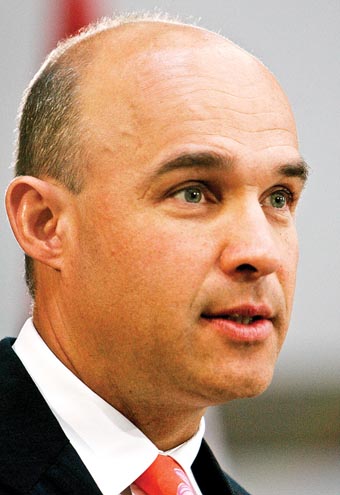Conflict of interest occurs between academic freedom and private corporate interests
Hamid Adem
Assistant News Editor
 York has officially rejected an offer of $60 million from former RIM co-CEO, Jim Balsilie, for a joint international law program, citing restrictions on academic freedom as the deal-breaker.
York has officially rejected an offer of $60 million from former RIM co-CEO, Jim Balsilie, for a joint international law program, citing restrictions on academic freedom as the deal-breaker.
After eight months of planning, Osgoode Faculty Council voted 34-7 on April 2 against the deal with concerns that the academic freedom of the new joint law program
would be compromised.
The original deal, which was to put two members of the Centre for International Governance Innovation on the steering committee, who would be responsible for hiring shortlists, was scrapped and that provision was taken out.
However, this amendment was still not enough for the Osgoode faculty council to vote in favour of the deal.
“I don’t believe there was just a single concern,” Lorne Sossin, Dean of Osgoode Law school, writes in a statement to Excalibur, when asked about the reasons behind the rejection of the deal. “Various faculty council members expressed different concerns. This was a decision of the university following the vote of Osgoode’s Faculty Council.”
More than 200 York professors signed a letter petitioning the deal that, they say, gives the private Centre for International Governance Innovation “unprecedented influence over the University’s academic affairs.”
York made the decision to reject the deal on the grounds that it would make little sense to sign a partnership without Osgoode’s approval.
This deal would have funded 20 PhD students and appointed of 10 research chairs.
“The agreement would have been an extreme case of the university giving control of academic matters to a donor’s private think tank,” says James Turk, executive director of Canadian Association of University Teachers.
“The fight which was led by the faculty at Osgoode law school and their refusal to go along with it was ultimately what caused York to abandon it.”
The second protocol agreement, signed in February 2012, was to ensure that CIGI would follow York’s existing policies and procedures concerning academic freedom. The third, signed March 2012, concerned hiring faculty members.
“People continued to raise concerns,” says CIGI’s vice president of public affairs, Fred Kuntz. “And I think they were misreading the documents and didn’t understand
all of the issues that have been addressed by those protocols drafted by York and signed and agreed upon by CIGI.”
CIGI currently has a partnership with the University of Waterloo and Wilfrid Laurier University, which created the Balsillie School of International Affairs.




